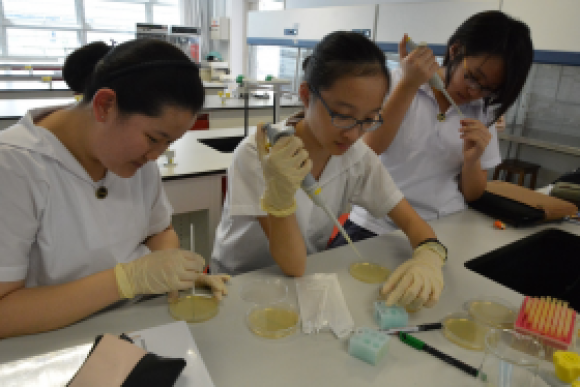Lam Mei Kien has been teaching science in Singapore for 34 years, 24 of which at Methodist Girls’ School. Always looking for ways to improve the STEM education, Mei Kien chanced upon the Amgen Biotech Experience (ABE) and knew it would be a great fit for her students. She signed up immediately for a teacher training workshop and piloted the program in 2018.
ABE caught up with Mei Kien to learn more about her path to teaching.
Why did you choose teaching as a career?
I joined the teaching service as I realised that teaching was very meaningful and rewarding, especially when students came back after their graduation to express how much we, as their teachers had impacted their lives and how we had influenced their career choices.
What subject(s) have you taught?
The subjects that I have taught are the sciences, such as physics, chemistry, biology and life sciences in secondary schools. At my current school, Methodist Girls’ School, my main teaching subjects are biology and STEM.
Why were you drawn to the ABE programme when you first learned of it?
The ABE programme covers all my favourite areas in the Life Sciences, such as gene cloning, bacterial transformation, extraction and purification of proteins, running gel electrophoresis and polymerase chain reactions. I was thrilled that I could conduct all these exciting and advanced experiments in school to enrich our students’ learning, with the full support from Amgen. It was a wonderful opportunity that I did not want to miss!
How has ABE helped to engage your students in new ways (e.g., hands-on laboratory experience, good curriculum, classroom tools/resources etc.)?
The content in the ABE lab, part of the O-Level Biology syllabus on genetic engineering, is typically covered only in textbooks in schools in Singapore. Most schools would cover the theory but without lab sessions due to lack of materials and biotech equipment. With ABE, the complicated experiments, once thought to be carried out by scientists only, are now made simple and doable to secondary school students.
What impact has ABE had on your students, school and community?
The students felt that they were privileged to be selected to pilot the ABE program. They had the opportunity to use the professional tools and techniques in introducing new genes into an organism and have that organism produce a new protein. Earlier in April, they shared this enthusiasm with other students during a presentation at STEM Week. In a recent open house conducted by the school in October, the students also shared their learnings from ABE to visitors, which included parents and prospective students. Students feel a deep appreciation for biotechnology as biotech plays an important role in improving healthcare not only for the aging population in Singapore but for the young and healthy ones as well. There is a lot of potential and opportunity in Singapore as there is support from the government and investments from giant biotech companies.
Name the three most valuable things that science teachers would get out of participating in ABE.
The ABE program is very comprehensive and very well designed. The experiments are reproducible with good results. Definitely a golden opportunity not to be missed. In fact, our school intends to increase the number of classes participating in ABE.
